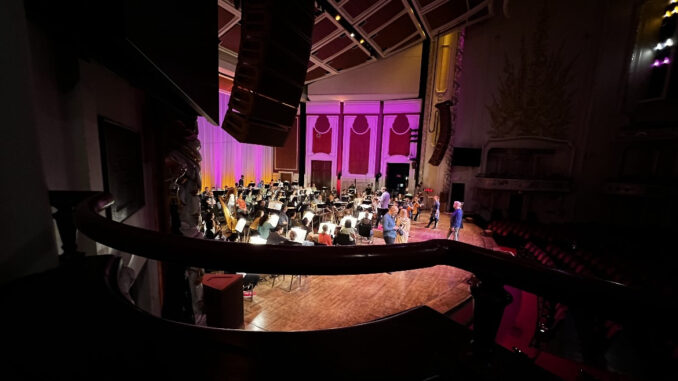
Rio Scarcelli | Staff Writer
Nov. 10, 2022
The Pittsburgh Symphony Orchestra joined together on Nov. 6 with Finnish a cappella group Rajaton to perform hits from “Mamma Mia!” Audience members were left singing “Thank You for the Music” as the ensembles celebrated 50 years of 70s pop group ABBA.
Rajaton and the PSO under maestro Steve Reineke’s direction delivered a high-energy performance that paid tribute to ABBA for the years of iconic songs they have released. With melodies so infectious and a full orchestra of support, it was hard not to become immersed in the music and embrace that ’70s feeling.
The audience was a mix of all age groups coming to attend the performance. Unlike more classical performances by the PSO curates, their Pops concerts pull in people from other genres of music.
It showed how transcendent ABBA’s music truly was even though some of the people there were not alive to experience the group’s debut.
The vocalists’ outfits stood as a sharp contrast to PSO’s concert-black ensemble. The women sported shimmery silver ensembles resembling the in-musical band Donna and the Dynamos. The men opted to wear gray disco-style suits and stood in for Sophie’s three dads from the movie.
Because the a capella group had an entire symphony orchestra to back them, Rajaton took a more flexible approach to the songs and altered roles and vocals when necessary. This meant most solo repertoire from the musical was cut or abbreviated to allow as much participation from the PSO and Rajaton as possible.
In overture-style, the orchestra previewed a slurry of numbers that they would perform for the night including “Gimme! Gimme! Gimme!” and “S.O.S.” The iconic xylophone line got an excited response from the audience as the “Mamma Mia!” instrumental theme opened up the scene.
During this time, the members from Rajaton all entered the stage with theatrics and the audience rose with applause. Alto Soila Sariola then led the charge with the next song “Money, Money, Money” as Donna Sheridan. The harmonies provided by the backup singers were lush and the orchestra had a strong moment to usher in the key change of the song, which was led with energy by Reineke.
The pacing of flashy-ensemble numbers to more emotional pieces was strong as bass Jussi Chydenius took the role of Harry Bright in “Thank You for the Music.” In this part, Rajaton seemed to add more harmonies to the piece to give it a more full sound against the orchestra.
All members of the PSO and Rajaton alike had strong, independent voices to bring to the table. In more company numbers like “Dancing Queen” and “Under Attack,” the vocalists and orchestra both had their own moments to take over portions of the song.
This back-and-forth created a strong chemistry between the two groups that engaged the audience even more.
For the final number “I do, I do, I do, I do, I do,” the instrumentation in the orchestra felt more similar to a mariachi band with trumpets, violins and castanets doing most of the ensemble work. This spin on the song created a contrasting timbre to Rajaton’s vocalists and the traditional work of ABBA. Nearing the end of the piece, the audience rose and stayed in a standing ovation.
In “Mamma Mia!” fashion, the show did not end there. Reineke gave the audience time to applaud while Rajaton exited the stage, but he gave a cue to the PSO to play the starting notes of the song “Mamma Mia” to usher in the singers one more time. They continued their set with “Dancing Queen” and “Waterloo” with the audience being encouraged to sing along.
The encore felt like a final celebration and tribute to ABBA that encapsulated their legacy through the timeless musical. It was through strong vocals, interactive dancing and a fun environment that Rajaton and the PSO brought their audience in for a night of reminiscing on one of the ’70s most iconic pop groups.

